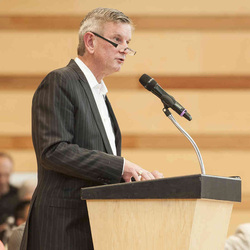 Alan Fletcher, of the Aspen Festival.
Alan Fletcher, of the Aspen Festival. In it, he decries the ongoing struggles of orchestras – especially in Minnesota, where the St. Paul Chamber Orchestra endured a six-month lockout, and the Minnesota Orchestra has been bogged down in a labour dispute since October.
At one point, he announces, “It is not true that the musicians create everything important about the music, and staff are merely assistants.”
What? Does Fletcher really believe these words? And has he thought through the implications of what he’s saying?
For starters, this assertion defies any logical application of the concept of “means and ends.”
In an orchestra, the end, or ultimate goal, is the performance of music. (Or, at least, it ought to be.) From this it follows that the musicians are the principal means to this end. And from this it follows that administrators and board members are a means to a means to an end. There’s a clear hierarchy at work here.
Moreover, Fletcher’s statement fails to take into consideration the asymmetrical nature of the commitments required from the different elements within an orchestra. Where administrators and board members are concerned, their place within the orchestral machinery could be described as “what they do.” Of course, it’s hoped that they will do these things well – and to do them well requires intelligence, dedication, professional expertise, and even a dash of creativity.
But for orchestral musicians, playing music isn’t just what they do – it defines them.
Classical musicians usually begin their training as young children. In their college years, only the most talented and determined will find their way into those conservatories and universities capable of turning out professional musicians. It’s an intense, competitive and narrowly focused kind of education that raises the stakes for those who go down this route.
Then, upon graduation, these young musicians must find jobs. This means auditioning for orchestras – and anyone who has ever sat in on an orchestral audition session would soon understand that it’s a grueling and nerve-wracking experience, well beyond the challenges of applying for a “normal” job. In short, it’s about a hundred times more difficult to win a chair in a professional orchestra than it is to win a chair behind a desk in the orchestra’s office.
In striking contrast with the musicians in the orchestra, administrators and board members sometimes have an indifference to classical music, per se. Often, it is their desire to work “in the arts,” and they don’t much care which branch of the arts they work in. They tend to move around a lot, from one arts organization to another.
I don’t mean to say that administrators and boards are less necessary than the musicians. On the contrary, no orchestra could possibly function at a professional level without these people and the work they do. And Fletcher is right when he argues that it’s vital for all the organizational elements within an orchestra to be respectful and supportive of each other.
But to equate a marketing manager with a concertmaster is to display an appalling lack of empathy towards musicians who have struggled long and hard for their professional positions. It is egalitarianism gone mad.
© Colin Eatock 2013
 RSS Feed
RSS Feed

